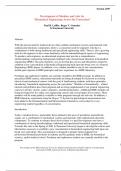Session 2109
Development of Modules and Labs for
“Biomedical Engineering Across the Curriculum”
Paul R. Leiffer, Roger V. Gonzalez
LeTourneau University
Abstract
With the present need for medical devices that combine mechanical systems and materials with
sophisticated electronic components, there is a concurrent need for engineers who have a
combination of both strong traditional and specialized engineering skills. There is also a growing
need for all engineers to have some familiarity with the human/biological aspects of engineering.
To produce such engineers, an educational program must provide a comprehensive
interdisciplinary engineering background combined with a broad-based education in biomedical
engineering (BME). Our goal, therefore, was to develop the courses and laboratories needed to
establish a new concentration in Biomedical Engineering built upon the broad core of a General
Engineering (BSE) degree. In addition, every student enrolled in one of our concentrations
should gain exposure to BME principles and have experience in a BME laboratory.
Freshman and sophomore students are currently enrolled in the BME program. In addition to
specialized BME courses, educational materials are being developed for inclusion in existing
electrical and mechanical courses with the goal of familiarizing students with these principles,
introducing “biomedical engineering across the curriculum.” Modules of biomedically - related
tutorials and problems have been prepared and are being implemented in our general engineering
courses in electric circuits, statics, dynamics, and thermodynamics. Additional BME modules are
being developed for five other core-engineering courses and several upper-level courses. These
modules will be made publicly available to other programs through our web site. In addition, a
BME laboratory experiment using the Biopac ™ System for physiological measurements has
been added to the Instrumentation and Measurements Laboratory course taken by every
engineering student regardless of concentration.
Introduction
Today’s medical devices, particularly those utilized in the areas of prosthetics and artificial
organs, are a combination of mechanical systems and materials with sophisticated electronic
components. To continue to enhance these devices there is a need for engineers who have a
combination of strong interdisciplinary traditional and specialized biomedical engineering skills.
Towards this end, in the Spring of 2001 LeTourneau University began to develop the courses and
laboratories necessary to establish a new concentration in biomedical engineering built upon our
broad core curriculum. This concentration is designed to prepare future engineers for
professional biomedical positions in industry and for graduate study in BME, the biomedical
sciences, and/or medical school. Freshman and sophomore students are currently enrolled in the
program.
Proceedings of the 2002 American Society for Engineering Education Annual Conference & Exposition
Copyright © 2002, American Society of Engineering Education
, Session 2109
For over twenty years the Engineering program at LeTourneau has offered an ABET -accredited
General Engineering (BSE) degree. Concentrations are available in electrical, mechanical, and,
recently, welding and computer engineering. In the first two years, all students take several core
courses in electrical and mechanical engineering, as well as a laboratory course in welding
principles and manufacturing operations. Biomedical engineering is being developed as a fifth
concentration, built upon the common core.
Part of our approach to the BME concentration includes a special integration of curriculum. The
concept of curricular integration has been occurring at all levels of education, from primary
grades through graduate school. In the spirit of past academic emphases on “writing across the
curriculum,” “ethics across the curriculum,” “computers across the curriculum,” and “design
across the curriculum,” the approach we have taken is that of introducing “biomedical
engineering across the curriculum.” Specialized materials (modules) are being developed for
inclusion in most of our existing traditional courses as a method of familiarizing all students with
BME principles. In addition, a biomedical experiment has been added to a sophomore level
instrumentation laboratory which is required of all students.
Our major goals in preparing the BME program are these:
1. A student majoring in biomedical engineering will have a strong foundation in traditional
engineering subjects (particularly circuits, statics, dynamics, and thermodynamics), coupled
with a specialized background in biomedical applications (bioinstrumentation, biosignal
processing, biomechanics, biocontrols). Students will realize the relationship between core
topics and BME applications as well as the connection between biomedical engineering and
other engineering disciplines.
2. A student majoring in any engineering discipline should have some familiarity with the
human/biological aspects of engineering. Every engineering student should have exposure to
BME principles and some experience in a BME laboratory setting.
Part of the goal of exposing every student to biomedical concepts is to cause them to think
seriously about safety and also about the place of the human body in their designs.
Safety of the user is a key constraint in all design. By understanding more about the heart,
students have a greater appreciation for electrical safety and an awareness of the risk of
fibrillation if currents pass across the heart. Human considerations in design would also include
ergonomics (making sure that the equipment is designed to fit the person rather than the person
forced to fit to the equipment) and human factors (understanding the types of actions humans are
capable of doing and the types of displays humans are capable of reading).
Modules
Because of the structure of our curriculum, we chose not to develop separate biofluids,
biothermodynamics, and bio-heat transfer courses; instead, we built on our common core
courses. In this way, we were able to stay within the basic core curriculum which is required of
all engineering students while providing biomedical exposure through various modules.
Proceedings of the 2002 American Society for Engineering Education Annual Conference & Exposition
Copyright © 2002, American Society of Engineering Education




